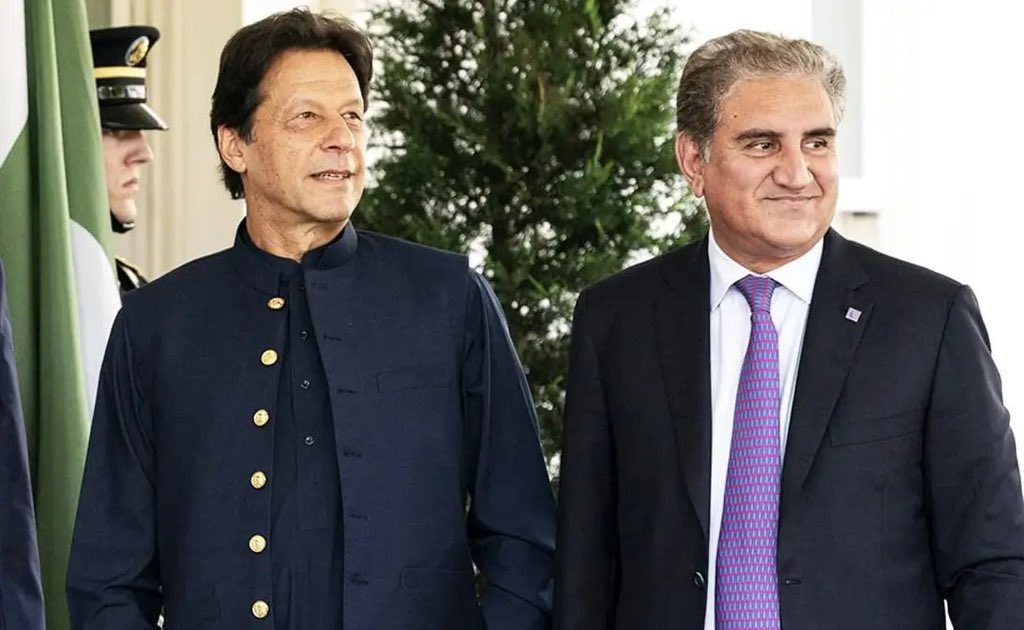The Islamabad High Court (IHC) on Monday acquitted Pakistan Tehreek-e-Insaf (PTI) leader Imran Khan and party leader Shah Mehmood Qureshi, overturning their convictions in the high-profile cipher case. The appeals were accepted by a bench comprising IHC Chief Justice Aamer Farooq and Justice Miangul Hassan Aurangzeb.
The cipher case, which has drawn significant public and media attention, revolves around allegations against former Prime Minister Imran Khan and former Foreign Minister Shah Mehmood Qureshi. The accusations stemmed from the purported misuse of a secret diplomatic cable sent by Pakistan’s ambassador in Washington to the government in Islamabad. The content of the cable, which was allegedly disclosed by Imran Khan, was deemed a breach of the Official Secrets Act.
Earlier, a special court established under the Official Secrets Act had sentenced both Imran Khan and Shah Mehmood Qureshi to ten years in prison. The court found them guilty of compromising the confidentiality of diplomatic communications for political purposes. The convictions were based on the argument that revealing the contents of the secret cable constituted a serious violation of national security protocols and diplomatic norms.
Imran Khan and Shah Mehmood Qureshi subsequently filed appeals against their convictions, asserting that the trial court’s decision was flawed and that the charges against them were politically motivated. Their legal teams argued that the actions in question did not warrant such severe punishments and that the trial had not adequately considered the context in which the disclosures were made.
The IHC bench, after reviewing the appeals and the evidence presented, ruled in favor of the PTI leaders. Chief Justice Aamer Farooq and Justice Miangul Hassan Aurangzeb concluded that the convictions lacked sufficient legal basis and that the prosecution had failed to incontrovertibly prove that the disclosures were made with malicious intent to harm national interests.
The IHC’s decision to acquit Imran Khan and Shah Mehmood Qureshi was based on several key considerations:
Insufficient Evidence: The court noted that the evidence presented by the prosecution did not conclusively establish that the disclosures were made with the intent to harm national security.
Context of Disclosure: The court took into account the context in which the disclosures were made, considering the argument that the actions were politically motivated and not intended to compromise national security.
Legal Procedures: The bench also highlighted procedural lapses in the trial process, which undermined the legitimacy of the original verdict.
Political Implications: The court acknowledged the political implications of the case and emphasized the importance of ensuring that legal decisions are free from political bias.
The acquittal of Imran Khan and Shah Mehmood Qureshi has elicited varied reactions across the political spectrum. Supporters of PTI have hailed the decision as a victory for justice and a vindication of their leaders. They argue that the case was part of a broader strategy to undermine PTI and its leadership.
Conversely, critics of PTI and political opponents have expressed concerns over the acquittal, suggesting that it might embolden individuals to disclose sensitive information without facing appropriate consequences. They emphasize the need for strict adherence to laws governing national security and diplomatic communications.
The IHC’s decision marks a significant turning point in the cipher case, potentially setting a precedent for how similar cases might be handled in the future. It underscores the judiciary’s role in ensuring that legal processes are fair and free from undue influence.
The government, meanwhile, faces the challenge of addressing the broader implications of the case. This includes ensuring that national security protocols are robust and that there are clear guidelines and consequences for breaches of confidentiality.




